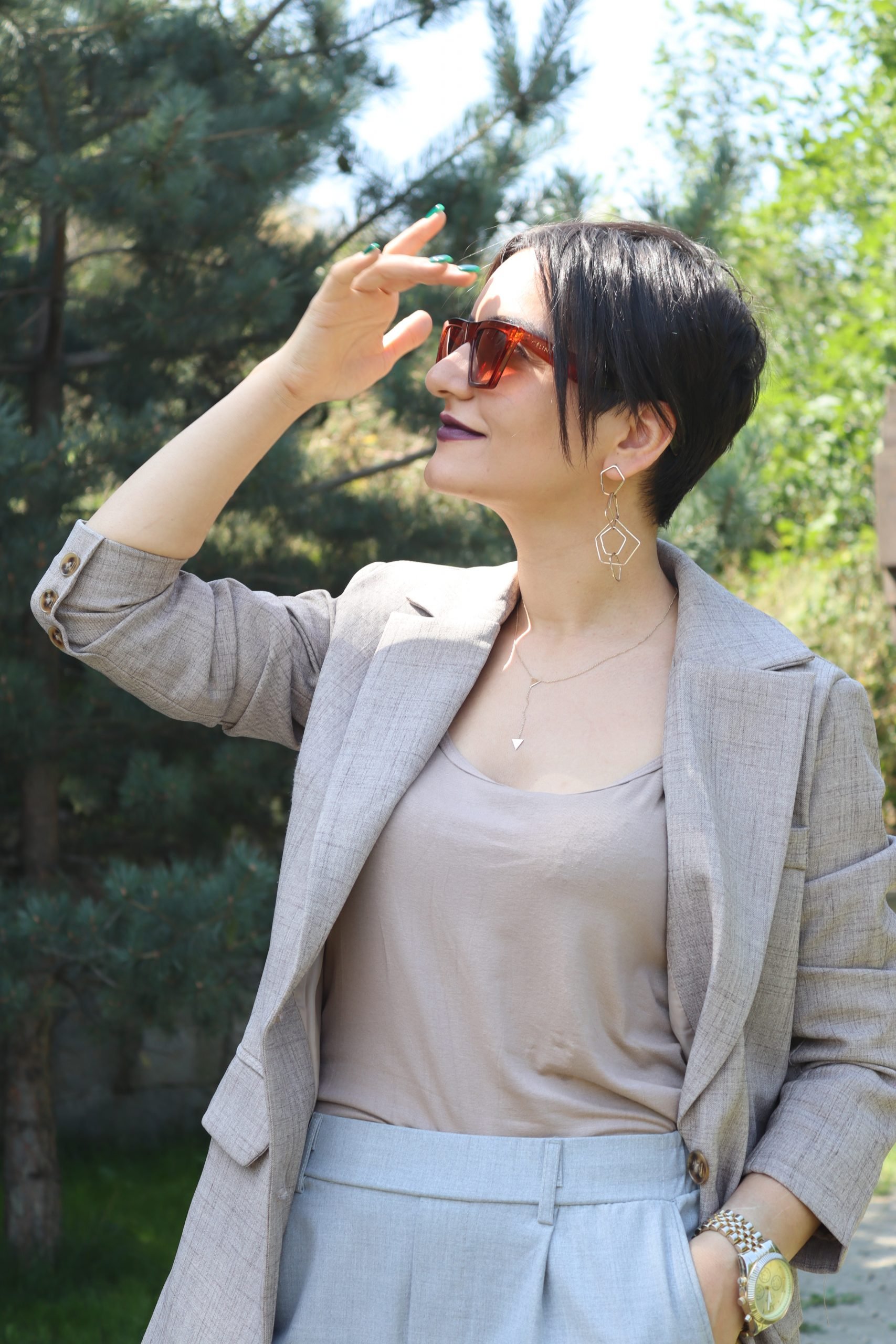
(Female) poet Hasmik Simonyan says that speaking was an unbearably difficult task for her. “I am a writing person, I am not an oral one and speech is my biggest enemy. I even dreamed of being mute, but at some point, I felt that I no longer wanted to live with that feeling of comfort. ”
The rhythm of talking and silence is generally very interesting in our lives when the gossip on social networks and public portraits (masks) help to be heard. Even when by and large you have nothing to say.
The conversation with Hasmik Simonyan is about that. For her, this rhythm is a working tool and an occasion for observations.
She has ideas for various projects, from a festival to the creation of individual media platforms. Writes, translates, coordinates Text Platform, builds connections, tries to talk about interdisciplinary bridges. She also prepares educational programs on the role of women (books, lectures, research) with great love and pleasure.
Many things have been slowed down or canceled now, as Armenia is not very attractive for international initiatives after 2020, being labeled an insecure country. And that uncertainty is also transferred to the inner world.
Social networks have become a part of everyday life. In any case, it seems so. How important is it for you to be online and follow the thoughts and shocks of the Armenian sector?
Everything is determined by the algorithm in social networks. Do you remember the “Mirror” cartoon, that’s how we actually see our face, which is our choice.
For example, whatever you watch on TikTok, that’s what it will show you next. Facebook, Instagram and others offer you the kind of things you watch, and TikTok is literally your mirror, you will only see the person you like, I think even similar creators are not offered there.
Social networks are a great tool, depending on how you use them. You need to be able to restrain yourself from spending too much time there. For example, I do not allow myself to enter social networks in the morning. Sometimes it works, sometimes it doesn’t. You need strength to find balance and not depend on networks.
There is a good chance that you will be trapped because it is a fact that other people see your life, which may give you the illusion that it is you. Whatever you do, you will live parallel lives. And both in life and online, you are responsible for what you write, your likes and your comments.
Facebook, for example, is a big market. Everyone expresses themselves about everyone and everything, often with a terrible vocabulary, pathos or a desire to insult intentionally. Is it difficult to remain silent?
When important things happen, you want to talk about them all the time, but the army of speakers is so big (by the way, both those who think like you and those who think differently from you) that you think it is not worth adding noise to the noise.
As long as the desire is not to be the listener, but the speaker, social media platforms will not decrease. There is often a window in Instagram with the caption “Ask me questions,” “What question do you have for me?” “I have some time, if you have any questions, write.”
There is a need to be heard and therefore to feel important, which requires daily approval and satisfaction.

Hasmik Simonyan
Facebook gossip will never decrease because everyone wants to be heard and not to listen. And the lack of discussion is noticeable. There is a great desire to say things that are unquestionable, aphoristic, to be denied as little as possible.
Learning to listen is important, even if only to be able to ask questions, if you listen, it may also turn out that someone has already said what you want. And they may have put it into better words than you could have.
The connection between poetry and public speech is always interesting. What are the signs of a touching and pathetic political speech, a recitation? The Prime Minister also started Independence Day with poetry. Why?
Pashinyan has referred to poetry before, as well as what he wrote. A couple of years ago I wrote that the only way to respond to that is to vomit in the bathroom.
That’s abrupt…
I spoke about poems and not about a person, loved or not loved, understood or not so much. What Pashinyan wrote was the biggest piece of garbage. I remember the “Literary Newspaper,” which is the official newspaper of the WUA and, in fact, is obliged to publish all the members of the Writers’ Union. On the principle of “the place of garbage is in the garbage.”
It is a very good question, as to in which case they speak the language of poetry.
Perhaps, when the responsibility is corrupted and the field of action is empty, words come in as a substitute for something that existed in the very beginning and only later should be determined and materialized.
After the war, you constantly try to collect yourself (which is a very difficult process) and work, but the feeling of insecurity demotivates you. And all that remains is to say words. Not because it is the easiest, but also the only fulcrum.
So too was the day of Armenia’s independence, when glorious cries were heard everywhere. Euphoric love for the lost is the saddest and worst thing. When my grandfather died recently, I was reminded of the mourning ceremonies I witnessed and how older women sang lamentations about the deceased, praising his life, his appearance, his wonderful human qualities, and glorifying the deceased.
When you glorify, then is it dead?
Of course. You do not glorify the living, you criticize it. You are not afraid to hurt, to sting because the living thing has the power to resist and recover. And when unstoppable admiration begins, defeat invades the verbal domain, and with that everything ends.
If you live in an independent country, you have the right to be criticized. And when the country flows through your hands, all you have to do is say, my dear, tender homeland, how poor you are, my wounded.
Having pity on yourself has nothing to do with loving yourself. We regularly confuse love with pity. Love always brings change, albeit painful, but it is about a situation beyond comfort and allows you to grow, develop and change.
And you feel pity when you want to stay in a comfortable area, at first sight, always safe, but without any personal growth, qualitative change.
The most problematic character for me is Little Mher, who is a symbol of narrow-mindedness and inaction. Close yourself from the world and wait for the world to get better. Meanwhile, the world could be changed by one’s own efforts. At least the world around you.
But no, the most beloved hero of our epic prefers to enter the cave, as politicians prefer to hide behind words and wait for someone from another world to come and try to solve their problems.
When Mher comes out, because the rose has become the size of a walnut, he will no longer have anything to do and be on this earth, just as we will have nothing to do, place and language in the case of problems solved by others.
And what motivates the audience to follow and respond to the media, which seem to bring out brave and free speech, but have vague goals?
The yellow press has always been full of scandals and gossip. It is easy to get into it, there is no effort to think, and gossip is also time-consuming. People start talking, expressing themselves, draining their inner energy and that’s it … they are happy on the outside.
In addition, the day is over, you can go to bed, relieved and thankful for doing something important: you wrote a status, received likes and comments, you were in the center of life. You lived a full day in front of everyone. In front of everyone, they lived a few times a lot, were flattered with every like, and their sorrow was taken down a notch.
And then the next day opens, with the new gossip.
Every day the media feeds us with at least one important substance. There is always at least one topic that everyone discusses. Some of them start talking about it, and all the others enter the game by eating the food.
We all probably ask ourselves that question: to eat or not to eat that food, to talk or not to talk about it? In other words, the question of adding noise to the noise arises again.
Is it harder to be silent than to speak?
Sometimes, yes.
As I studied silence and its various manifestations, I came across a very interesting fact. During World War II, Soviet troops consisted of criminal battalions composed of criminals and assassins.
Before marching on, soldiers usually shout, “Hurray!” “Attack!” “Long live something!” It is a united call that raises the fighting spirit, uniting thousands and uniting the strength of all.
And it is very important not to control emotions, to swear at the last option, etc. But during the war, these soldiers were not allowed to shout or make a sound. They had to march silently and unscathed. The unbridled rage produced noticeable results, and in fact, they fought much better.
The explanation is that when you are silent, it is as if you are waging your own personal war. And the man, appearing alone before the great war, uses all his (even that which doesn’t exist) courage.
Silence is also very important in the text. That is, where you pause, where you cut the line and which word is silent.
The unification of Armenians is fast and euphoric, but then we collapse just as fast. We often say “we” in our speech, as if thus increasing us and leaving no role for ourselves. Speaking on behalf of oneself is a greater responsibility that not everyone is ready to bear.
For example, we have a large Diaspora, which means that we have others different from us. But we persistently want everyone to be similar, not to be different, to have one nation, one culture. But it isn’t like that in reality, is it?
And what do you think about femininity when the profession also takes on a sex?
I myself opposed for a very long time when I was called a female poet. Female suffixes seemed to be a sign that they wanted to belittle, humiliate, diminish and humiliate a woman. For example, a female deputy, a female director, a female journalist, etc.

Hasmik Simonyan
In our speech, the words immediately take on a contemptuous tone when the female suffixes appear, and when they want to emphasize that the person in front of them is, first of all, a woman, the literal meaning is that the person is an unqualified specialist.
And, in fact, when a woman refuses to say “female” she involuntarily tries to be equal to a man, considering that being a man is a sign of quality, and thus concurs and continues to discriminate against women.
For a long time I thought that Armenian is a asexual language.
I was even proud of that fact, I was quoting our epic. “A lion is a lion, it does not matter whether it is a female or a male.” But the current view allows me to notice that when there is no such division of the sexes in the language, only “na” works. That “na” probably means a man. And the woman is absent from language, just as she is absent from living and working areas.
A female author, for example. Is not good.
Inconvenience, dissatisfaction with words (and not only) is better. It gives food for thought. There is no need to be afraid of dissatisfaction. Rather, you should be afraid when you become just a repeater, without looking into the depth of your own language and history.
Now is the time to try and explore. In order to formulate, we must first try to identify ourselves with words that have long been petrified in books, have been silent like a grave, or do not speak like a woman.
Now the words around us are active links and we can click and recognize them. If we want. Do we want to, will we dare, or will we wave and say, like c’mon bro, don’t bother with that trouble?
Interview by Nune Hakhverdyan


Add new comment
Comments by Media.am readers become public after moderation. We urge our readers not to leave anonymous comments. It’s always nice to know with whom one is speaking.
We do not publish comments that contain profanities, non-normative lexicon, personal attacks or threats. We do not publish comments that spread hate.